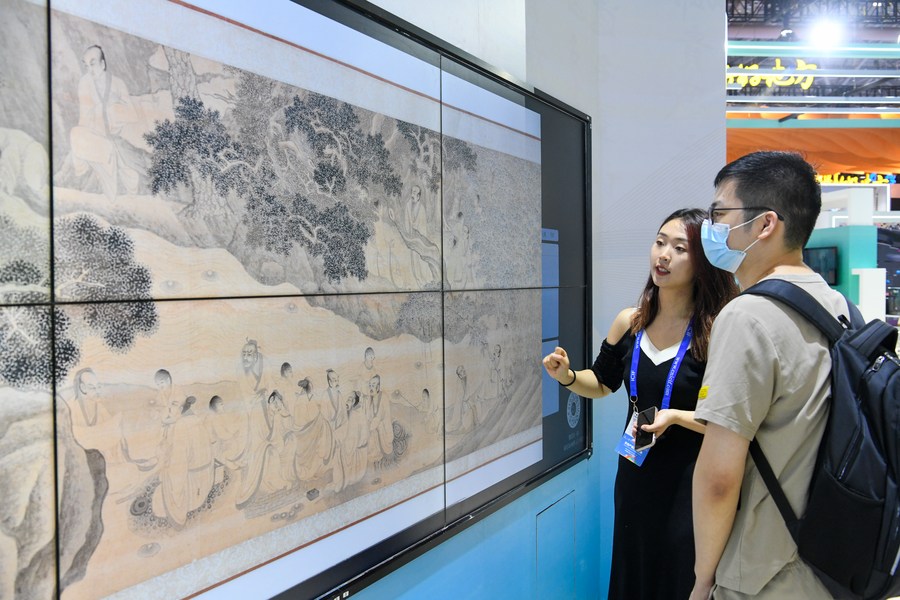Digitalization a new frontier for globalizing Chinese culture

A visitor watches a digital display of traditional Chinese poetry at the 19th China (Shenzhen) International Cultural Industries Fair in Shenzhen, south China's Guangdong Province, June 8, 2023. (Xinhua/Liang Xu)
SHENZHEN, June 11 (Xinhua) -- Digital culture products, such as online games, have emerged as a major channel for traditional Chinese culture to meet a global audience.
From player outfits inspired by Buddhist murals to flying swordsmen playable character choices, ancient Chinese arts and legends feature prominently in popular online games that have appeared at the 19th China (Shenzhen) International Cultural Industries Fair, which is being held from June 7-11 in the southern Chinese tech hub of Shenzhen.
At the fair, Chinese internet giant Tencent showcased a mural-themed player appearance, developed together with the Dunhuang Academy, which has been made available in its internationally popular game "Arena of Valor."
"The 'skin' has had excellent responses from young users, and has enabled gamers from home and abroad to appreciate and understand the murals at Dunhuang's Mogao Grottoes," according to a Tencent booth worker.
And Tencent is not alone in its attempt to make traditional Chinese culture trendy in the global gaming market. Lilith Games, a leading mobile game developer in China, has implanted famous historical and fictional characters from China into its "Rise of Kingdoms" game.
Speaking at the first Forum on Building up China's Cultural Strength, which was also held in Shenzhen, Hu Rui, co-founder of Lilith Games, said that their unique cultural charms have helped Chinese games increase their appeal in the global market.
"For Chinese game developers that aim to raise their global influence, a greater focus is now on the integration of traditional Chinese culture," Hu said.
According to a report released by the Academy of Contemporary China and World Studies (ACCWS) in February, the digital culture industry has become one of the country's fastest-growing cultural industries.
Among the digital culture products, online literature, online animation, online movies and TV dramas, online games, online music, short videos and live broadcasts have become a major force in introducing the Chinese culture to the world, the report said.
Industry observers have accredited the digital culture boom to the country's massive expansion of digital infrastructure and growing confidence in the Chinese culture.
Liu Zhen, vice president of Kuaishou Technology, said that China now has 1 billion short-video platform users, accounting for over 90 percent of all its internet users, while globally, the proportion of short-video platform users is far lower.
"Compared with the increasingly saturated domestic market, overseas markets hold promising prospects," Liu said.
According to the Ministry of Commerce, China's foreign culture trade volume had exceeded 220 billion U.S. dollars in 2022, a yearly increase of about 11 percent, with imports and exports of cultural products reaching 180.3 billion dollars and those of cultural services totaling 41.4 billion dollars.
"The most important channel for innovation at present is one that embraces digital and smart technologies," said Yu Yunquan, head of the ACCWS, expressing hope that the digital trend will usher in a new era for Chinese culture overseas.


